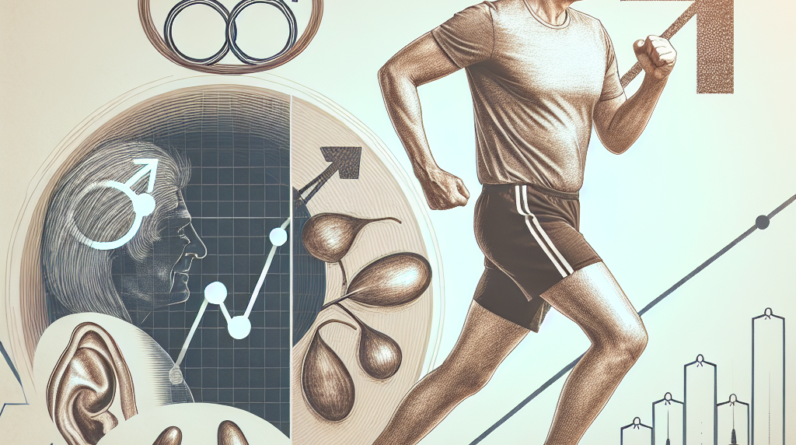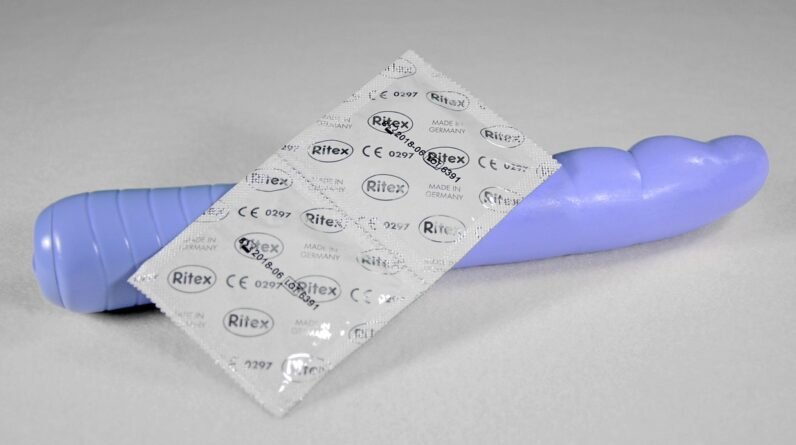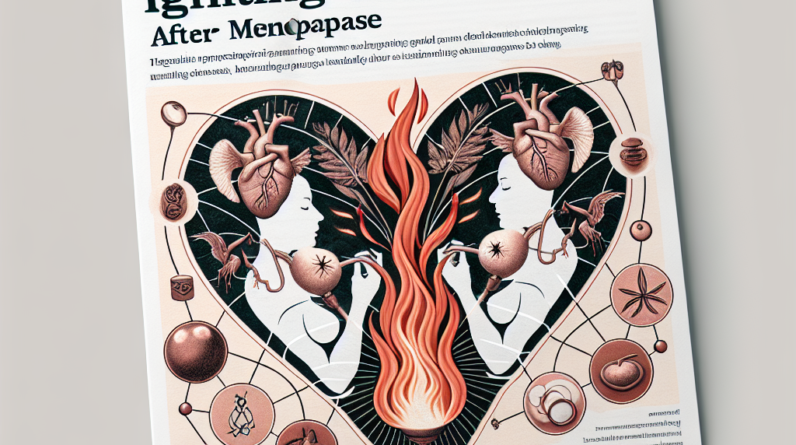
Have you ever wondered at what age a man’s sex drive starts to decrease? It’s a common question that many people have, especially as they age. In this article, we’ll explore the factors that can influence a man’s sex drive as he gets older and provide some helpful tips on how to maintain a satisfying sex life well into older age. Whether you’re curious about your own sex drive or wanting to better understand the experiences of the men in your life, this article will shed some light on the topic and provide valuable insights. So, let’s dive in and learn more about the age at which men’s sex drive may decrease.

Factors that affect men’s sex drive
Physical health
Physical health plays a crucial role in determining a man’s sex drive. Chronic illnesses such as heart disease, diabetes, and obesity can significantly impact sexual desire. These conditions affect blood flow and hormone levels, which ultimately affects libido. Additionally, weight-related issues can lead to decreased self-confidence and body image concerns, which can also impact a man’s sex drive. Maintaining a healthy lifestyle through regular exercise, a balanced diet, and managing chronic health conditions can help improve sexual desire.
Hormonal changes
Hormonal changes in men can have a significant impact on their sex drive. Testosterone, the primary male sex hormone, plays a crucial role in regulating libido. As men age, testosterone levels naturally decline, which can result in a decrease in sexual desire. Other hormones, such as dopamine and serotonin, also play a role in sexual arousal and can affect a man’s sex drive.
Medications and medical conditions
Certain medications and medical conditions can affect a man’s sex drive. Antidepressants and mood stabilizers, commonly prescribed to treat mental health conditions, can have side effects of reduced libido and sexual dysfunction. Blood pressure medications and beta-blockers can also have similar effects. Prostate conditions and treatments, such as surgery or radiation therapy, can impact sexual function and desire. Additionally, some diabetes medications may have side effects that affect sexual performance.
Psychological factors
Psychological factors play a significant role in men’s sex drive. Stress, anxiety, and depression can all have negative effects on libido. Relationship issues, such as unresolved conflicts or trust issues, can also impact sexual desire. Additionally, body image concerns, low self-esteem, and performance anxiety can all contribute to a decrease in sex drive. Addressing and managing these psychological factors can help improve and restore sexual desire.
Relationship status
The relationship status of a man can impact his sex drive. In monogamous relationships, sexual desire can fluctuate over time. Factors such as relationship length, frequency of sexual activity, and overall satisfaction can all influence libido. Long-term partnerships often require ongoing effort to maintain sexual intimacy, and maintaining trust and open communication can help preserve a healthy sex drive. Infidelity and trust issues can have a significant impact on sexual desire, as they introduce additional emotional and psychological factors that can affect intimacy.
Understanding the stages of male sexual development
Adolescence
Adolescence marks the beginning of sexual development in males. During this stage, sexual desire and curiosity start to emerge. Boys begin to experience sexual thoughts and may start exploring their bodies and masturbating. Hormonal changes, primarily driven by the release of testosterone, contribute to the onset of sexual desire in adolescence.
Young adulthood
In young adulthood, men typically experience a peak in sexual desire. This stage is characterized by a strong drive for sexual activity and exploration. Young adults often engage in experimentation and may have multiple sexual partners. Building sexual confidence and exploring one’s desires and preferences are common during this stage.
Middle adulthood
Middle adulthood is a stage characterized by stability and maturity. Sexual desire may remain relatively constant during this period, although it can vary depending on individual circumstances. Balancing responsibilities such as career, family, and personal life can impact the frequency and intensity of sexual activity. Understanding personal preferences and maintaining a healthy sexual relationship with a partner becomes essential during this stage.
Older age
As men age, hormonal changes can lead to a decrease in sexual desire. Testosterone levels gradually decline, impacting libido. However, it’s important to note that individual experiences can vary, and not all men will experience a significant decline in sex drive with age. Factors such as overall health, lifestyle choices, and relationship satisfaction can also influence sexual desire in older men. Hormonal changes, the effect of aging on sexual functioning, and the importance of relationship satisfaction and intimacy all play a role in a man’s sex drive during older age.
Sex drive in adolescence
The onset of sexual desire
Adolescence is a time of significant physical and emotional changes, including the onset of sexual desire. Sexual thoughts and fantasies begin to emerge, and young males may experience spontaneous erections and wet dreams. The surge of testosterone during this period contributes to the development of sexual desire.
Puberty and hormonal changes
Puberty marks the beginning of hormonal changes in males. Testosterone is the primary hormone responsible for the development of secondary sexual characteristics and sexual desire. During puberty, testosterone production increases, leading to physical changes such as increased muscle mass, growth of facial and body hair, deepening of the voice, and the development of the reproductive organs.
Exploring and experimenting
During adolescence, young males often engage in exploring their sexuality and experimenting with masturbation. This period of self-discovery helps individuals understand their bodies and establish a foundation for their sexual development. It is a crucial time for learning about sexual preferences, boundaries, and healthy attitudes towards sex.
Sex drive in young adulthood
Peak sexual desire
Young adulthood is often characterized by a peak in sexual desire. Hormonal levels are at their highest, contributing to a strong sex drive. Biological factors, coupled with a sense of sexual exploration and novelty, can result in a heightened interest in sexual activities during this stage of life.
Experimental phase
In young adulthood, individuals may engage in experimentation and exploration of their sexual preferences. This stage often involves having multiple sexual partners and trying out different sexual practices. It is a time of exploration and self-discovery, where individuals learn about their likes, dislikes, and boundaries,
Building sexual confidence
Young adulthood is also a crucial period for building sexual confidence. As individuals gain more experience and become more familiar with their bodies and desires, they develop a better understanding of their sexual needs. This increased self-awareness and confidence can positively impact one’s sex drive and overall sexual satisfaction.

Sex drive in middle adulthood
Stability and maturity
Middle adulthood typically brings stability and maturity, which can impact a man’s sex drive. The intensity of sexual desire may vary during this stage, influenced by factors such as stress, health issues, and relationship dynamics. However, many individuals still maintain a healthy sex drive and derive significant pleasure from sexual activities during this period.
Balancing responsibilities
Middle adulthood is often accompanied by various responsibilities such as career, family, and financial obligations. Balancing these demands can impact the time and energy available for sexual activities. It is essential to manage these responsibilities effectively and communicate openly with partners to maintain a satisfying sexual relationship.
Understanding personal preferences
As individuals reach middle adulthood, they usually have a better understanding of their personal preferences and desires. This self-awareness can contribute to an improved sex drive and sexual satisfaction. Middle-aged men are more likely to have a clear understanding of what excites them sexually and can communicate their needs effectively to their partners.
Sex drive in older age
Hormonal changes and testosterone
With advancing age, men experience a decline in testosterone levels. This decline can result in a decrease in sexual desire and energy. However, it is important to note that not all older men will experience a significant decline in sex drive. Maintaining overall health through regular exercise, a balanced diet, and managing chronic health conditions can help mitigate the effects of hormonal changes on sexual desire.
Effect of aging on sexual functioning
Aging can affect various aspects of sexual functioning. It may take longer for older men to achieve and maintain an erection. The intensity of orgasms may also decrease. However, with appropriate care and attention, older individuals can continue to enjoy a fulfilling and satisfying sex life. Open communication with partners, exploring new sexual techniques, and seeking medical advice when necessary can all contribute to maintaining sexual function in older age.
Relationship satisfaction and intimacy
Relationship satisfaction and intimacy play a crucial role in older men’s sex drive. Emotional connection, trust, and a sense of closeness with a partner can enhance sexual desire and pleasure. Older couples who prioritize and nurture their relationship often find that their sex drive remains intact despite the natural changes that come with aging. It is essential to maintain open and honest communication, as well as seek support when needed, to ensure a healthy and fulfilling sexual relationship.
Impact of physical health on sex drive
Chronic illnesses
Chronic illnesses such as heart disease, diabetes, and obesity can have a significant impact on a man’s sex drive. These conditions affect blood flow, nerve function, and hormone levels, all of which are essential for sexual arousal and functioning. Managing these conditions through appropriate medical treatment, lifestyle changes, and regular check-ups can help maintain sexual desire.
Obesity and weight-related issues
Obesity and weight-related issues can contribute to a decrease in sex drive. Excess weight can affect hormone levels, increase the risk of conditions such as diabetes and heart disease, and impact body image and self-confidence. Adopting a healthy lifestyle, including regular exercise and a balanced diet, can help improve overall health and positively impact sexual desire.
Cardiovascular health
Cardiovascular health plays a significant role in a man’s sex drive. Conditions such as high blood pressure and heart disease can affect blood flow to the genital area, resulting in reduced sexual desire and performance. It is essential to manage cardiovascular health through regular exercise, a heart-healthy diet, and appropriate medical treatment to support a healthy sex drive.
Diabetes and sexual dysfunction
Diabetes can impact both physical and psychological aspects of sexual functioning. It can affect nerve function, blood flow, and hormone levels, leading to reduced sexual desire and performance. Managing diabetes through proper blood sugar control, lifestyle changes, and medical treatment can help minimize the impact of the condition on sexual function and maintain a healthy sex drive.
Hormonal changes and their role
Testosterone production and decline
Testosterone is the primary male sex hormone and plays a crucial role in regulating libido. As men age, testosterone levels naturally decline. This decline can result in a decrease in sexual desire and energy. However, it is important to note that testosterone levels can vary significantly among individuals. Some men may experience a more significant decline, while others may have a more gradual decrease. Regular exercise, a healthy diet, and managing chronic health conditions can help optimize testosterone levels and support a healthy sex drive.
Effects of other hormones (dopamine, serotonin, etc.)
In addition to testosterone, other hormones such as dopamine and serotonin also play a role in sexual desire. Dopamine is associated with pleasure and reward, while serotonin affects mood and emotions. Imbalances or changes in these hormones can affect sexual arousal and desire. Maintaining overall mental and emotional well-being through stress management, healthy relationships, and self-care can help support a healthy balance of these hormones and positively impact sex drive.
Role of estrogen in men’s sex drive
While estrogen is primarily associated with female sexual development, it also has a role in men’s sex drive. In men, small amounts of estrogen are produced through the conversion of testosterone. Estrogen helps maintain bone density, regulate cholesterol levels, and influence sexual function. Imbalances in estrogen levels can affect sexual desire and overall health. Monitoring and managing estrogen levels, when necessary, can help support a healthy sex drive in men.
Medications and medical conditions affecting sex drive
Antidepressants and mood stabilizers
Many antidepressant and mood stabilizer medications can have side effects that affect sexual desire and function. These medications often work by altering levels of neurotransmitters in the brain, which can impact sexual function. Common side effects include reduced libido, delayed orgasm, and erectile dysfunction. It is essential to communicate openly with a healthcare professional about any sexual side effects experienced and explore potential alternative treatments.
Blood pressure medications and beta-blockers
Certain blood pressure medications, particularly beta-blockers, can have side effects that impact sexual desire and performance. These medications work by blocking the effects of certain hormones in the body, potentially leading to decreased libido, difficulty achieving or maintaining an erection, and reduced sexual satisfaction. Discussing concerns and possible alternative medications with a healthcare professional is important for managing both blood pressure and sexual health.
Prostate conditions and treatments
Prostate conditions such as an enlarged prostate or prostate cancer can affect sexual desire and function. Treatments for these conditions, including surgery, radiation therapy, and hormone therapy, can have side effects such as erectile dysfunction and reduced libido. Consultation with healthcare professionals, including urologists and oncologists, can help individuals understand and prepare for potential sexual side effects and explore available treatment options.
Diabetes medications and side effects
Some medications used to manage diabetes, such as certain oral medications and insulin, can have side effects that affect sexual function. These medications can impact blood flow, nerve function, and hormone levels, all of which are crucial for sexual arousal and performance. It is important to work closely with healthcare professionals to manage diabetes and minimize potential side effects on sexual health.
Relation between sex drive and relationship status
Desire in monogamous relationships
Sexual desire in monogamous relationships can fluctuate over time. Various factors can influence desire, including relationship length, overall relationship satisfaction, communication, and emotional connection. Partners are encouraged to discuss their desires openly, maintain a sense of novelty and excitement, and continue investing in the emotional and sexual bond to support a healthy sex drive.
Sexual intimacy in long-term partnerships
Long-term partnerships often require ongoing effort to maintain sexual intimacy. As the relationship evolves, sexual desire may change. Couples can explore new ways to connect intimately, prioritize open communication, and be receptive to each other’s needs and desires. Creating a safe and trusting environment where both partners feel comfortable expressing their sexual desires can help sustain a satisfying sex drive in long-term partnerships.
Impact of infidelity and trust issues
Infidelity and trust issues can have a significant impact on sexual desire. Betrayal and a lack of trust can lead to emotional distress and a decrease in libido. Rebuilding trust and working through relationship issues, possibly with the help of a therapist, can help restore emotional and sexual intimacy. Open and honest communication is crucial for addressing concerns and rebuilding a healthy sex drive in the aftermath of infidelity or trust issues.
In conclusion, men’s sex drive is influenced by various factors, including physical health, hormonal changes, medications and medical conditions, psychological factors, and relationship status. Understanding and addressing these factors can help individuals maintain a healthy sex drive throughout different stages of life. It is important to prioritize overall well-being, maintain open communication with partners, and seek appropriate medical advice when needed to support a satisfying and fulfilling sex life.





